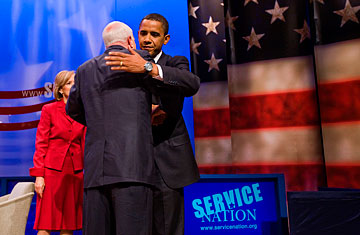
Barack Obama and John McCain embrace at a forum on national service in New York City on Sept. 11
Less than two weeks ago, on election night, John McCain pledged to do "all in my power to help [Barack Obama] lead us through the many challenges we face." On Monday, McCain will travel to Chicago to discuss ways he can fulfill that promise in a private meeting with the President-elect.
There were some who doubted the sincerity of McCain's pledge, coming so soon after the end of a campaign that featured a series of personal attacks on Obama. But it pays to remember that the self-styled maverick was never very comfortable as the standard bearer of a party that he had opposed so many times on so many issues. And the party long felt the same way. (See pictures of Obama's family tree.)
Last Friday brought notice that the relationship between the two would soon be returning to form when South Carolina Senator Jim DeMint became the first high-profile Republican to lay the blame for McCain's loss on McCain himself. "We have to be honest, and there's a lot of blame to go around," DeMint told a GOP gathering in Myrtle Beach, S.C. "But I have to mention George Bush, and I have to mention Ted Stevens, and I'm afraid I even have to mention John McCain." DeMint then offered a list of McCain's anti-conservative apostasies, including his support for campaign finance reform, immigration reform and legislation aimed at combating global warming.
The items on DeMint's list of lament read like talking points to jump-start Monday afternoon's conversation in Chicago between McCain and Obama. According to an Obama aide, the President-elect views McCain as a potential ally on the kind of reform issues for which the two men share broad agreement. "There are areas of general agreement and beliefs — on immigration, earmark reform, energy, climate change, government reform, spending reform," says the aide. "Where there's agreement on both sides, they want to figure out ways they can work together."
Sources close to McCain say their man wants to leave the campaign behind and return to the role he forged for himself on Capitol Hill as the leading reformer and bipartisan legislator in the Senate. "John isn't one to wallow in defeat, at least not publicly," says a Republican consultant who knows McCain well. "He lost. It's over. Work is all he really knows, and getting back to work will help him move past losing. And the patriot in him is telling him to help this new President out."
Evidence of both sides' sincerity can be found in the middle men who were involved in setting up the meeting. When McCain called Obama to concede defeat the night of Nov. 4, the two men talked about getting together. Lindsey Graham, South Carolina's other Senator and the person Cindy McCain calls her husband's "best friend," followed up on that call in a conversation with Rahm Emanuel, Obama's choice for White House chief of staff. Then Obama spoke directly with Graham, and out of that came the decision to hold the meeting sooner rather than later. (See pictures of Obama's campaign.)
By meeting with McCain shortly after the election, Obama is demonstrating both magnanimity and self-confidence. But his move is also based on self-interest. Obama is keenly aware of the fact that, despite increased Democratic majorities in both the Senate and the House, he cannot enact the kind of sweeping legislative overhaul he envisions without the help of Republicans. Energy reform, climate-control legislation, health-care reform — all are too big to be passed by partisan majorities, especially if Obama wants to retain his post-partisan, "President of all the people" mantle.
"The question becomes, is it the McCain running for President that we're getting, or the McCain free from the shackles of running for President. We think it's the latter," says a Democratic official. "McCain becomes a power center. The fact is, we don't have 60 votes [in the Senate]. Barack is of a reform mind, and so is McCain. And you can cut through a lot of the crap if they work together."
